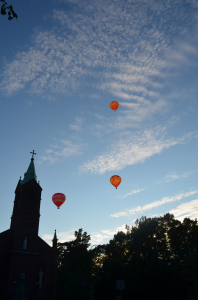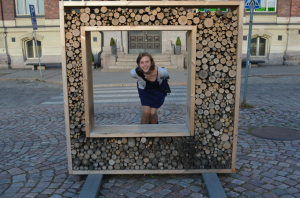During August 2012 Esmarie attended the Helsinki Summer School, here is her story.
Pre-departure:
You are an Industrial Engineering student. You just got accepted for a summer school on the Finnish education system – a system rumoured to be the best in the world. Having spent the best part of the first semester on “the other side” of University education – drawing up assignments, marking projects and handling students’ queries – you are convinced that the system can be improved. Somehow. You have some ideas and they’re not half bad, but you just have this feeling that the Finns might have a few amazing things up their sleeves.
I have raised two important issues already:
- I am an engineer by training. Most of my friends are engineers. A lot of what we talk about would not interest most other people I know… You catch my drift. A month or so before leaving, it hit me – I would be spending three weeks with people who, instead of agreeing to his good sense, would probably laugh at the engineer who, given the choice between a woman, the clothes she had just been wearing and her bicycle, chose the bicycle reasoning that “the clothes obviously wouldn’t fit”. Nerves started kicking in right about then.
- On top of my fear that my classmates and I would have incompatible senses of humour, the pre-course assignment (and the many terms I had never come across before) was another reminder that I might be in over my head. The assignment was not very difficult, but the terminology and structure of the articles differed significantly from the articles I had gotten used to on this side of Merriman. When people asked if I was excited, my eyes got really big, my voice really small, I did one of those “smiling would make this less awkward”-grimaces and said “I’m a bit nervous.”
On a practical note, I applied for my Schengen visa through the Finnish embassy in Pretoria (as I am originally from there and was at home for the holidays). Having previously had to apply for visas from other embassies, I could not believe how friendly, helpful and efficient the people working there were. Having decided to go on an impulsive backpacking trip after summer school, I had quite a lot of questions about my application and the accompanying documentation, but they were forthcoming and patiently answered all my questions.
In general the Postgraduate & International Office was very helpful and the administration for the trip was simple to do on my own. Note: buy your plane ticket with a credit card to get free travel insurance. Talk to your bank for more information on this.
I am a firm believer in not packing a heavier bag than I am able to handle on my own. This is quite a challenge if you have to remember bedding (which I forgot), warm things, a few pairs of shoes, a few nice things for functions and presentations, comfortable clothes for some of the excursions, entertainment for when you’ll be travelling (I would recommend a book of Sudoku puzzles as you could get very far with just one and good music), a notebook or something similar for class, some form of computer (I took an iPad) and chargers for all the electronics we cannot live without nowadays. Thanks to the fact that I forgot my bedding, I did manage to pack everything into just my brother’s hiking backpack and my shoulder sling bag. I was quite proud.
One of the girls in my class at summer school brought post cards from home, writing each of us a note with her contact details as going away present when the course ended. I did not think of something similar, but thought it worth mentioning. Take some photographs of Stellenbosch or Table Mountain or the flowers in Namakwaland…
At the summer school:
Stellenbosch University and the Helsinki Summer School have a housing arrangement whereby we do not have to pay for accommodation. Essentially we were housed in bachelor flats (with a small kitchen and bathroom) belonging to the University of Helsinki in Pihlijamaki, one of Helsinki’s suburbs. A lot of the summer school students choose to stay there and there is always something quirky or fun happening. The flats are roughly a half an hour bus trip from the main station, but the number of students living there means that you almost never have to make this trip on your own if you do not want to.
There is no need to have anyone with you, though. Helsinki is very safe. It is also a very pedestrian friendly city, the city centre not really being spread out, and you can easily walk to most of the landmarks around the centre. I did just this, exploring before and after class on weekdays. I also loved the public transport in Helsinki and would sometimes just hop on the tram or a bus to see where it would go. I can tell you that they go some pretty amazing places, but do not have enough words to specify what these places are. You would just have to find out for yourself.
Despite my nerves regarding my course, it turned out that I was not the only person who did not have a background in education. Our class was made up of people from all the continents except Antarctica. There were philology, psychology and art students. There were teaching students, elementary and high school teachers and educational faculty members. They ranged from ages 19 to 60. And each and every one of them was really friendly and eager to learn more about the other people in our class. It was interesting to hear how some students came, not so much with the purpose of learning from the instructors, but rather with the aim of learning from the other students.
My course essentially covered the basic principles of the Finnish education system, their ideas on Multi- and Interculturalism and PISA (a standardised test taken in many countries around the world, so as to find which educational strategies work well and which don’t). It has to be said that my course was not very demanding: we had lectures from 10:00 to 15:00, with an hour lunch in between. We did not have homework assignments and could use our free time to explore Helsinki and surrounds, take part in the Helsinki Summer School social programme and get to know our fellow students. I think we all appreciated this!
Helsinki is the World Design Capital this year (Cape Town will be in 2014) and this meant that there was more to do around town than usual. I do not think any of us got around to doing everything we would have liked. Even if we had gotten around to everything, the Finns tell us that it is worth the trip to go there in winter, when Helsinki is covered in snow, the Baltic sea bordering it freezes over, and Finns head out to go ice skating on the ocean.
Returning home:
Despite the very good museums, well-spoken guides and other perfectly good sources on Finland that were available, I learnt much more about other people, their cultures and South Africa than I did about education and Finland. These were tough lessons at times, but mostly good ones.
What stood out most from conversations and debates in our class, with friends made at summer school and the other people you tend to talk to along the way, was the way we deal with race in South Africa. Foreigners asking questions about politics in the country tend to shy away from racial labels. In South Africa we are much more likely to refer to our own race or the race of someone else; we tick boxes categorising ourselves by our race almost daily.
It is difficult to believe, but over the years I had gotten so used to being classified by race that it no longer occurred to me that people in other countries might not be defined first and foremost by their race. This seems obvious, seeing as to the fact that someone’s race does not tell you much about them as a person. This begs the question: should we still be using this classification, often incorrectly inferring characteristics on people based on their race, in post-Apartheid, democratic South Africa?
These, and other similar thoughts, still keep me awake some nights, creep into any conversations remotely related to politics and will affect the way I think about the problems we face for a long way to come.
After summer school finished, I went on to Stockholm, Berlin, Amsterdam, Antwerp and Reykjavik. I saw beautiful sights. I learnt interesting facts and saw masterpieces in museums. I stood gaping at the magnificence of an old church or castle. I ate delicious food and drank some very good beer. I spent days on trains, busses and trams. I truly enjoyed all of this and appreciate the opportunity beyond what I am able to express. But, and this is a big clichéd “but”, what I enjoyed the most – what made the biggest impact on me – was the people I encountered along the way. The people attending summer school, the used-to be –strangers on the train, the crazy Polish guy ”4×4-ing” with his rented Toyota Yaris across Iceland, the German who wants to do his PhD (developing something with which you could create music by just thinking about it) in Japan and the old friends in Belgium – this is what I miss the most.


